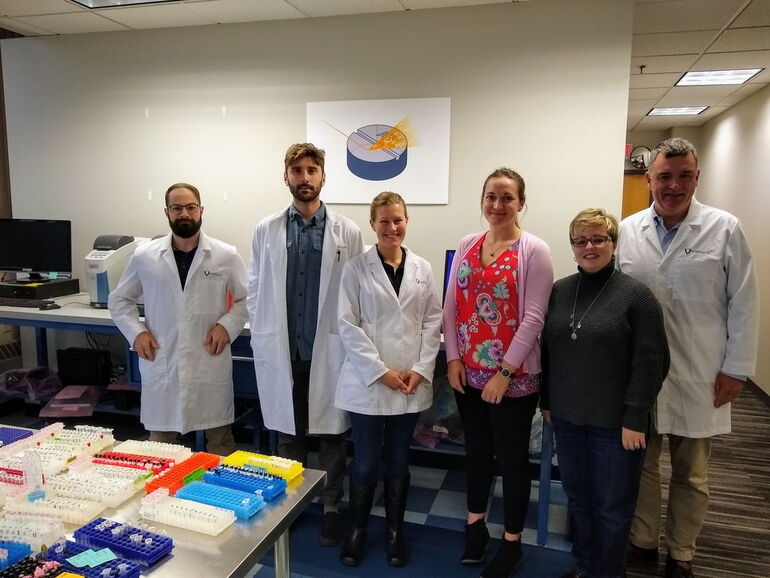Processing Your Payment
Please do not leave this page until complete. This can take a few moments.
- News
-
Editions
View Digital Editions
Biweekly Issues
- May 13, 2024
- April 29, 2024
- April 15, 2024
- April 1, 2024
- March 18, 2024
- March 4, 2024
- February 19, 2024
- February 5, 2024
- January 22, 2024
- + More
Special Editions
- Lists
- Viewpoints
- HBJ Events
- Business Calendar
- Custom Content
New Haven’s Valisure ground zero for Zantac recall
 PHOTO | File image by Liese Klein
Valisure staff members (l-r): Nico Zenzola, research associate; David Preli, senior research associate; Kaury Kucera, chief scientific officer; Amber Jessop, data scientist; Jessica Williston, administrative assistant, and Paul Barry, pharmacist.
PHOTO | File image by Liese Klein
Valisure staff members (l-r): Nico Zenzola, research associate; David Preli, senior research associate; Kaury Kucera, chief scientific officer; Amber Jessop, data scientist; Jessica Williston, administrative assistant, and Paul Barry, pharmacist.
An online pharmacy based in Science Park is in the national spotlight for sparking a worldwide recall of the popular over-the-counter and prescription heartburn drug Zantac.
Valisure, a startup that runs quality checks on all the medication it sells, first alerted the U.S. Food & Drug Administration in June that it discovered a potentially cancer-causing substance during routine testing of the stomach-acid reducing drug.
The substance, NDMA, or N-nitrosodimethylamine, is a “probable human carcinogen” and is also found in water and foods, including cured meats.
The FDA issued an alert about the discovery on Sept. 13 and said it was investigating, but that preliminary tests showed the risk was low, with levels that “barely exceed the amounts you might expect to find in common foods.” Valisure’s testing found levels that were much higher.
However, the federal regulatory agency ratcheted up its level of concern in an Oct. 2 update, saying “early, limited testing” found “unacceptable levels” of NDMA in samples of ranitidine, which is the generic name for Zantac.
So far, the FDA has not ordered a recall of Zantac or its generic versions. But major pharmacy chains, including Walmart, Walgreens, Rite-Aid and CVS have pulled the medicine from their shelves and several pharmaceutical firms have voluntarily stopped selling it. The drug has been recalled in more than two dozen countries, according to a list on Valisure’s website.
The FDA has not instructed patients to stop taking ranitidine, but suggested those taking over-the-counter versions may wish to switch to other heartburn drugs while the FDA evaluates the extent of the risk. Those taking prescription Zantac should talk to their doctor, the FDA advises.
Meanwhile, Valisure has filed a citizens' petition urging the FDA to recall the widely-used medication. Nearly 25 million prescriptions were written for Zantac and its generics in 2018, according to Bloomberg.
“There’s no acceptable cancer risk for a drug like this,” Valisure CEO David Light said in a statement posted on the company’s website.
In its Oct. 2 statement, the FDA said it was continuing to test ranitidine products from multiple manufacturers and is “assessing the potential impact on patients who have been taking ranitidine.”
The agency is asking drugmakers to test their own batches of the drug and also send samples to the FDA.
The FDA also disputed the testing methods of a “third-party laboratory” saying the high temperatures used are “not suitable for testing ranitidine because heating the sample generates NDMA,” resulting in much higher levels. It did not mention Valisure by name.
The agency recommended manufacturers test using a low-temperature method employed by the FDA.
However, in an email to New Haven Biz Tuesday, Light said Valisure’s lab also found high levels of NDMA using a “body-temperature” testing method it developed to mimic the conditions of the human stomach.
Citing ranitidine’s “fundamental instability,” Light said that testing suggests the drug is reacting with itself during digestion to produce NDMA levels “vastly exceeding the maximum permissible daily exposure set by the FDA.”
***
Hamden-based biotech Vanessa Research Inc. said Tuesday it has acquired Hungaro-Gal, a Hungarian pharmaceutical contract manufacturing company.
Terms of the deal were not disclosed.
VRI, which already has a presence in Hungary with offices in Gyor and Budapest, said it plans to continue and expand Hungaro-Gal’s contract manufacturing business.
It will also use the company’s facility in Kaposvar, Hungary to produce its flagship drug Shylicine, which targets microvillus inclusion disease (MVID), a condition that causes chronic diarrhea in infants.
In a statement, VRI said Hungary has become a hub for manufacturing and R&D activities for drug and biotech companies, citing its “well-qualified and cost-effective labor force, outstanding logistical network and easily accessible location.”
In addition to its Hamden and Hungary locations, VRI has a satellite lab at UConn’s Technology Incubation Program facility in Farmington and offices in London and Navarre, Spain.
The company also makes non-drug products including Seal’n Freeze, a portable cryogenic freezing device for tissue samples, a skin product called KLAREXbalm, and SOLaware, which detects UV radiation.
Contact Natalie Missakian at news@newhavenbiz.com

2022 Giving Guide
This special edition informs and connects businesses with nonprofit organizations that are aligned with what they care about. Each nonprofit profile provides a crisp snapshot of the organization’s mission, goals, area of service, giving and volunteer opportunities and board leadership.
Learn more
Subscribe
Hartford Business Journal provides the top coverage of news, trends, data, politics and personalities of the area’s business community. Get the news and information you need from the award-winning writers at HBJ. Don’t miss out - subscribe today.
Subscribe
2024 Book of Lists
Delivering Vital Marketplace Content and Context to Senior Decision Makers Throughout Greater Hartford and the State ... All Year Long!
Read Here-
2022 Giving Guide
This special edition informs and connects businesses with nonprofit organizations that are aligned with what they care about. Each nonprofit profile provides a crisp snapshot of the organization’s mission, goals, area of service, giving and volunteer opportunities and board leadership.
-
Subscribe
Hartford Business Journal provides the top coverage of news, trends, data, politics and personalities of the area’s business community. Get the news and information you need from the award-winning writers at HBJ. Don’t miss out - subscribe today.
-
2024 Book of Lists
Delivering Vital Marketplace Content and Context to Senior Decision Makers Throughout Greater Hartford and the State ... All Year Long!
ABOUT
ADVERTISE
NEW ENGLAND BUSINESS MEDIA SITES
No articles left
Get access now
In order to use this feature, we need some information from you. You can also login or register for a free account.
By clicking submit you are agreeing to our cookie usage and Privacy Policy
Already have an account? Login
Already have an account? Login
Want to create an account? Register
Get access now
In order to use this feature, we need some information from you. You can also login or register for a free account.
By clicking submit you are agreeing to our cookie usage and Privacy Policy
Already have an account? Login
Already have an account? Login
Want to create an account? Register






0 Comments